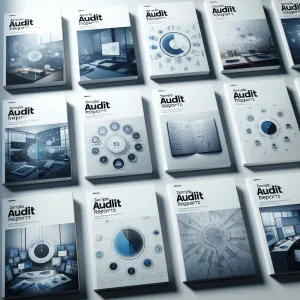In the dynamic world of internal auditing, staying ahead of the curve is essential. Enrolling in an ISO training course is one of the most effective ways to achieve this. ISO certification not only enhances the credibility of your audit processes but also aligns your organization with best practices in governance, risk management, and quality control. In this blog post, we will explore five compelling reasons why ISO certification is a game-changer for internal auditors and risk managers [1].
What is ISO Certification and Its Importance
ISO certification, or International Organization for Standardization certification, is the process of obtaining a third-party audit that confirms compliance with a specific international standard. For internal auditors, this certification is crucial as it ensures that audits are based on best practices and aligned with universally accepted standards. Here are some key benefits [2]:
- Credibility: ISO certification enhances stakeholder confidence in the accuracy and reliability of audit reports.
- Consistency and Efficiency: Adhering to established standards streamlines processes and reduces errors.
- Ongoing Improvement: Regular audits foster a culture of continuous learning and improvement.
- Competitive Edge: Organizations with ISO certification can differentiate themselves in a stringent regulatory environment.
Reason 1: Enhances Professional Credibility
Obtaining ISO certification significantly boosts the credibility of internal auditors and risk managers. Here’s how:
- Confidence in Audit Findings: ISO training equips auditors with the skills needed to conduct thorough audits, enhancing the reliability of their findings.
- Career Advancement: Specialized knowledge from an ISO training course positions auditors as subject matter experts, opening doors to new opportunities.
By investing in ISO certification, internal auditors not only enhance their professional reputation but also contribute to their organization’s success.
Reason 2: Fosters a Risk-Based Approach to Auditing
Transitioning to a risk-based audit methodology is essential in today’s complex business environment [3]. ISO certification supports this shift by:
- Identifying Risks: A risk-based approach allows auditors to focus on areas that pose the greatest threat to organizational objectives.
- Resource Allocation: Efficiently allocate resources to high-risk areas, enhancing overall risk management capabilities.
Implementing ISO standards can help internal auditors navigate this transition confidently, providing more value to their organizations.
Reason 3: Improves Audit Efficiency and Effectiveness
ISO certification streamlines audit processes, leading to:
- Standardized Processes: Establishing a quality management system (QMS) ensures consistency and reduces human error.
- Data-Driven Decisions: Leveraging data from audits allows organizations to monitor control effectiveness and prioritize resources effectively.
By embracing ISO certification, internal auditors can enhance their efficiency and effectiveness, ultimately driving business performance.
Reason 4: Supports Compliance with Regulatory Requirements
Regulatory compliance is a fundamental responsibility for internal auditors [4]. ISO certification aids in:
- Establishing Policies: Organizations can create clear policies that align with regulatory requirements.
- Ongoing Monitoring: Regular assessments ensure compliance and help organizations avoid costly penalties.
Understanding how ISO certification supports regulatory compliance is essential for internal auditors aiming to maintain stakeholder trust.
Reason 5: Enhances Organizational Reputation and Credibility
Achieving ISO certification significantly boosts an organization’s reputation [5]. Internal auditors can contribute by:
- Identifying Improvement Areas: Highlighting areas for improvement before the ISO audit ensures readiness.
- Developing Controls: Implementing effective controls that align with ISO requirements enhances compliance.
A strong reputation not only increases customer satisfaction but also improves supplier relationships and overall competitiveness [6].
Key Takeaways
- ISO certification enhances professional credibility and career prospects for internal auditors.
- A risk-based approach improves audit effectiveness and resource allocation.
- Standardized processes lead to greater efficiency and data-driven decision-making.
- Compliance with regulatory requirements is supported through ISO certification.
- Achieving ISO certification enhances organizational reputation and stakeholder trust.
FAQ
What is the process for obtaining ISO certification?
The process typically involves a thorough audit by a third-party organization, followed by the implementation of corrective actions to meet ISO standards.
How can I find an ISO training course?
Many organizations offer ISO training courses online and in-person. Look for accredited providers that specialize in internal auditing.
What are the costs associated with ISO certification?
Costs can vary widely depending on the size of the organization and the complexity of the certification process. It’s essential to budget for both training and the certification audit.
Best Practices for Implementing ISO Standards
- Engage Stakeholders: Collaborate with various departments to ensure a unified approach to ISO implementation.
- Continuous Monitoring: Regularly assess compliance and effectiveness of implemented controls.
- Invest in Training: Ensure that all team members are trained in ISO standards to maintain consistency and quality.
Conclusion
In conclusion, ISO certification is a transformative asset for internal auditors and risk managers. It not only enhances professional credibility but also fosters a risk-based approach, improves efficiency, supports compliance, and elevates organizational reputation. We encourage you to pursue an ISO training course to unlock these benefits and contribute significantly to your organization’s success. Take the next step in your career and embrace the power of ISO certification today!
Find out more about Shaun Stoltz https://www.shaunstoltz.com/about/
This post was written by an AI and reviewed/edited by a human.



